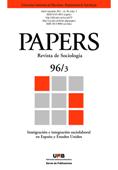Análisis sociológico de la Ley 4/2000, de 11 de enero, sobre derechos y libertades de los extranjeros en España y su integración social. Sus reformas (8/2000, 11/2003, 14/2003, 2/2009) y su implicación social
Article Sidebar

Main Article Content
Rosa M. Soriano-Miras
Act 4/2000, commonly known as the Aliens Act, has caused considerable debate in Spanish society about migration policy. The last decade, the Act has been amended repeatedly– a total of four amendments have been made. The most recent amendment was proposed in December 2009. This article reports the findings of research project I + D SEJ 2006-05222. Social Welfare and Immigration, funded by the Spanish Ministry of Science and Technology, and aims to examine this issue in depth. The provisions of the Act and their social implications were analysed using Grounded Theory. In addition, this article contextualises the political and social framework for justifying the Act for each set of amendments. We conclude, inter alia, that the Act is an attempt to respond to changes in the situation of aliens in Spain from a technical perspective, without an ideological objective. Nevertheless, the discursive logic of the Act focuses mainly on the need of “social control” over foreigners. The Act’s provisions cause a sort of metonymy between foreigners and immigrants. Thus, the Act contributes to an ever greater social divide between foreigners and nationals, with wide-ranging implications on identity and otherness processes.
Article Details
How to Cite
Soriano-Miras, Rosa M. “Análisis sociológico de la Ley 4/2000, de 11 de enero, sobre derechos y libertades de los extranjeros en España y su integración social. Sus reformas (8/2000, 11/2003, 14/2003, 2/2009) y su implicación social”. Papers: revista de sociologia, vol.VOL 96, no. 3, pp. 683-05, https://raco.cat/index.php/Papers/article/view/244982.